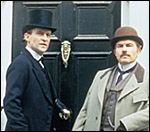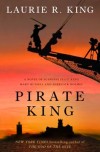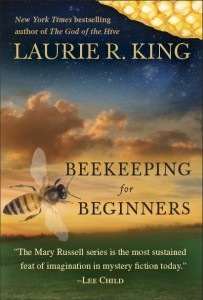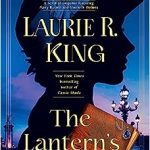 In 1914, Sherlock Holmes participated in his last official case as published by Dr. John Watson. The case, His Last Bow, took place at the eve of the First World War, and detailed the wrapping up of two years of Holmes’ infiltration into German espionage on British soil just before the Great War. At the end of the story, Holmes and Watson say goodbye, and Holmes returns to Sussex to keep bees. Mrs. Hudson even takes part in the case, going undercover as the German official’s housekeeper in order to assist Holmes.
In 1914, Sherlock Holmes participated in his last official case as published by Dr. John Watson. The case, His Last Bow, took place at the eve of the First World War, and detailed the wrapping up of two years of Holmes’ infiltration into German espionage on British soil just before the Great War. At the end of the story, Holmes and Watson say goodbye, and Holmes returns to Sussex to keep bees. Mrs. Hudson even takes part in the case, going undercover as the German official’s housekeeper in order to assist Holmes.
But after the case is over, Holmes is left with nothing to do. And His Majesty’s government comes to the realization that Holmes might have been killed, or even worse, kidnapped, during the course of his work. Ransoming a national treasure like Sherlock Holmes would have been even more embarrassing than a state funeral!
So Holmes is forced into a retirement with no hope of any cases to enliven his days. In the official Canon, this was never good. He descended into black moods, played the violin at all hours of the day and night, and resorted to cocaine. Mental inactivity was always a worse enemy than any criminal mastermind.
In 1994, mystery writer Laurie R. King published the first of the memoirs that she received from Miss Mary Russell. The memoirs were delivered by UPS in an old fashioned steamer trunk wrapped in cardboard. The stories they told were incredible.
 According to Miss Russell’s memoirs, in 1915, when she was 15, she quite literally tripped over Sherlock Holmes as she was walking over the Sussex Downs with her nose buried in a copy of Virgil. She was uncertain at first whether he was a tramp or just an Eccentric. During their subsequent conversation, his upper-class accent firmly placed him in the Eccentric category. But it wasn’t until she correctly deduced that he was attempting to find a group of feral bees to re-stock his hive that he realized that she might possibly have a brain. The story of their continued association, and Mary Russell’s training as Sherlock Holmes’ apprentice is told in The Beekeeper’s Apprentice.
According to Miss Russell’s memoirs, in 1915, when she was 15, she quite literally tripped over Sherlock Holmes as she was walking over the Sussex Downs with her nose buried in a copy of Virgil. She was uncertain at first whether he was a tramp or just an Eccentric. During their subsequent conversation, his upper-class accent firmly placed him in the Eccentric category. But it wasn’t until she correctly deduced that he was attempting to find a group of feral bees to re-stock his hive that he realized that she might possibly have a brain. The story of their continued association, and Mary Russell’s training as Sherlock Holmes’ apprentice is told in The Beekeeper’s Apprentice.
 Until now, the entire Mary Russell “Kanon” has been told from Russell’s perspective, and an absorbing one it has been. But in preparation for this fall’s release of the next book in the saga, titled The Pirate King, the story of Holmes’ and Russell’s initial meeting is finally being told from Holmes’ point of view.
Until now, the entire Mary Russell “Kanon” has been told from Russell’s perspective, and an absorbing one it has been. But in preparation for this fall’s release of the next book in the saga, titled The Pirate King, the story of Holmes’ and Russell’s initial meeting is finally being told from Holmes’ point of view.
 Beekeeping for Beginners is Holmes’ story of that fateful meeting. It has always been clear that Holmes rescued Russell, but until now, he has never been willing to admit that she saved him. Her training gave him purpose. Her sharpness of mind sharpened his own back to its laser-like brilliance. We all need to be needed. Even the Great Detective.
Beekeeping for Beginners is Holmes’ story of that fateful meeting. It has always been clear that Holmes rescued Russell, but until now, he has never been willing to admit that she saved him. Her training gave him purpose. Her sharpness of mind sharpened his own back to its laser-like brilliance. We all need to be needed. Even the Great Detective.
I discovered The Beekeeper’s Apprentice on audio when it first came out. The premise intrigued me. I had read a chunk of the Sherlock Holmes stories, but the idea of Holmes taking on an apprentice was, well, implausible, to say the least. But Mary Russell is more than a match for Holmes, and the period is perfect. She arrives in his life after the Conan Doyle Canon is over. I was captivated and enthralled, and each new book is a delight. But with Beekeeping for Beginners, I went back and reread not just the first part of Beekeeper’s Apprentice, but also His Last Bow. to see the whole story fabric knit together. It works. From the high of his last case, to the slough of despond of total ennui that Holmes so often experienced, to the bright, sharp girl who needs training, and becomes…if you haven’t read them yet, I envy your upcoming discovery.








